In research, you don’t just explore — you predict. But this isn’t guesswork. A solid hypothesis is your study’s secret weapon: it sets the direction, defines the variables, and gives your work a sharp, testable focus.
Whether you’re a student struggling through your thesis or a busy professional working on your master’s or Ph.D., understanding how to write a strong hypothesis can make or break your entire study.
In this post, we’ll walk you through smart hacks to craft a clear, confident, and testable hypothesis — minus the jargon, plus practical steps.
I. What is a Hypothesis, Really?
At its core, a hypothesis is a testable statement that predicts the relationship between two or more variables.
There are two main types:
- Null Hypothesis (H₀) – There is no significant relationship.
- Alternative Hypothesis (H₁ or Ha) – There is a significant relationship.
For example:
- Null: “There is no significant difference in test scores between students who study with music and those who don’t.”
- Alternative: “Students who study with music score higher than those who don’t.”
A hypothesis is not a wild guess. It’s rooted in logic, existing research, and your understanding of the topic.
II. The Formula for a Powerful Hypothesis
Use this simple structure:
If [Independent Variable], then [Dependent Variable], because [Rationale].
This format forces you to:
- Identify the cause (Independent Variable)
- Predict the effect (Dependent Variable)
- Provide a reason (based on logic or prior research)
Example:
If high school students sleep for less than six hours per night (IV), then their academic performance will decline (DV), because sleep deprivation reduces concentration and memory retention (Rationale).
III. How to Craft Your Hypothesis: Step-by-Step
1. Start With Your Research Question
This is your launchpad. For instance:
“How does social media usage affect study habits?”
2. Identify Your Variables
- Independent Variable (IV): Social media usage
- Dependent Variable (DV): Study habits (e.g., time spent studying, focus level)
3. Review the Literature
What do other studies say? Build your hypothesis on patterns or gaps you notice.
4. Predict Based on Logic
Based on the literature and your own observations, make an educated guess.
Prediction: Increased social media usage reduces the time spent on studying.
5. Directional vs. Non-Directional
Decide whether you’re stating what kind of effect you expect (directional) or just that some effect exists (non-directional).
- Directional: “Increased social media usage negatively affects study time.”
- Non-directional: “There is a significant relationship between social media usage and study time.”
6. Write Your Null and Alternative Hypothesis
- H₀: There is no significant relationship between social media usage and study time.
- H₁: There is a significant relationship between social media usage and study time.
IV. Hypothesis Hacks to Predict with Confidence
✅ Use Data from Previous Studies
Anchor your prediction in patterns found in existing research.
✅ Keep it Measurable
Avoid vague phrases like “improves behavior” or “makes a difference.” Be specific.
✅ Stay Testable
Only predict what you can actually measure within your study’s scope.
✅ Stick to One Variable Change at a Time
Don’t try to test multiple causes in one hypothesis — keep it clean and focused.
✅ Refine Based on Your Methodology
Once you finalize your tools or questionnaires, tweak your hypothesis for precision.
V. Real-Life Examples
🎓 Education
- H₀: There is no significant difference in exam scores between students who attend review sessions and those who don’t.
- H₁: Students who attend review sessions score higher in exams than those who don’t.
💼 Business
- H₀: Advertising spend has no effect on customer retention in e-commerce businesses.
- H₁: Increased advertising spend leads to higher customer retention in e-commerce businesses.
🩺 Health
- H₀: Screen time has no significant effect on the quality of sleep among young adults.
- H₁: Increased screen time before bed leads to poorer sleep quality among young adults.
VI. Common Hypothesis Mistakes to Avoid
🚫 Guessing Without Basis
Your hypothesis should be backed by logic or past studies — not vibes.
🚫 Being Too Emotional
Avoid biased words like “better,” “worse,” or “annoying.” Keep it neutral and testable.
🚫 Skipping the Null Hypothesis
Even if you’re confident in your prediction, include the null — it’s essential for analysis.
🚫 Predicting Everything at Once
One hypothesis, one relationship. Don’t combine multiple variables in a single statement.
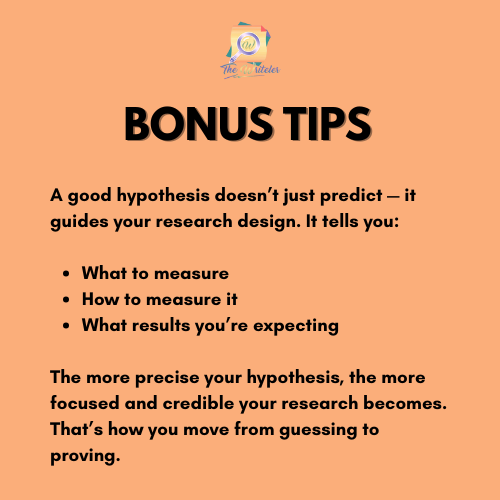
A good hypothesis doesn’t just predict — it guides your research design. It tells you:
- What to measure
- How to measure it
- What results you’re expecting
The more precise your hypothesis, the more focused and credible your research becomes. That’s how you move from guessing to proving.
📣 Need Help Writing a Research Hypothesis?
The Writeler Co. is here to support students and professionals who are juggling research with work, life, and business. Whether you’re writing a thesis, capstone, or dissertation for your master’s or Ph.D., we help you efficiently navigate the research journey — from brainstorming to proofreading.
📩 Message us today to get started.
📚 Let’s turn your research idea into a powerful paper.

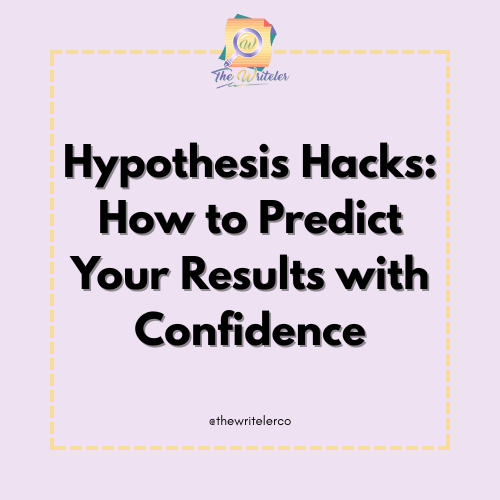
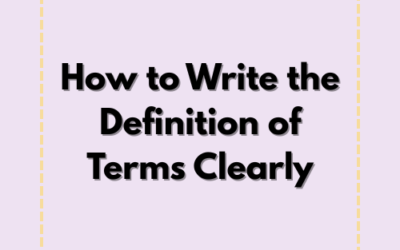
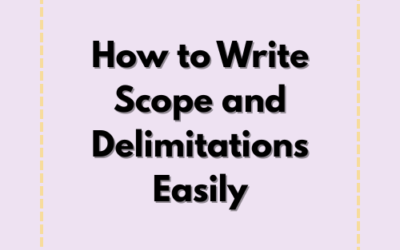
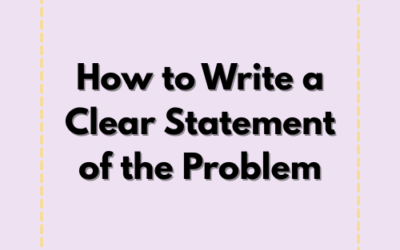
0 Comments